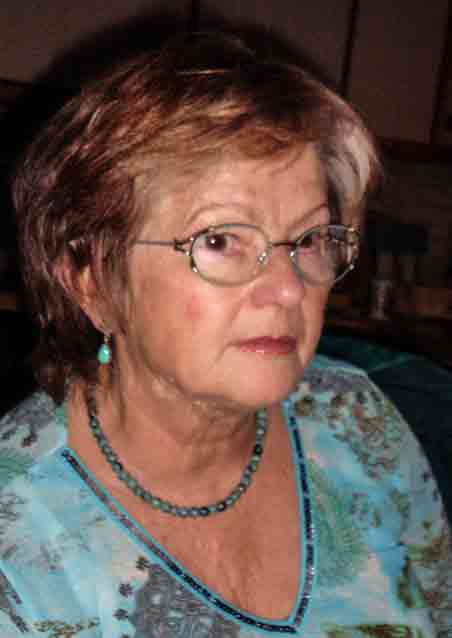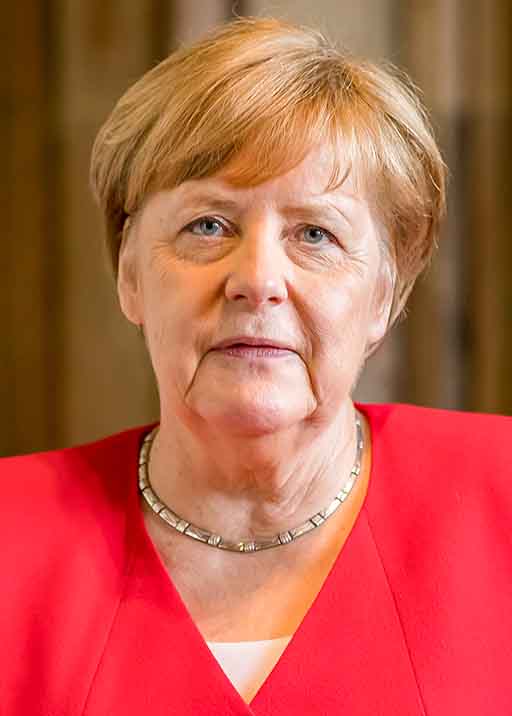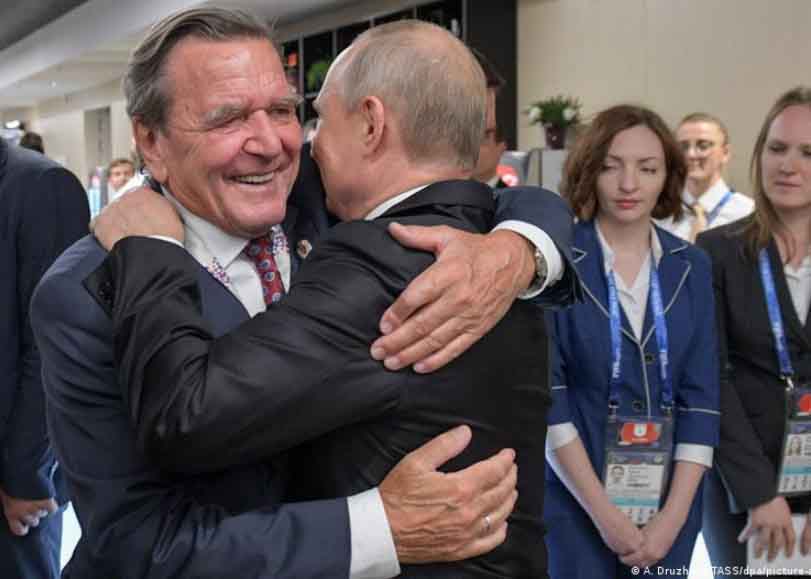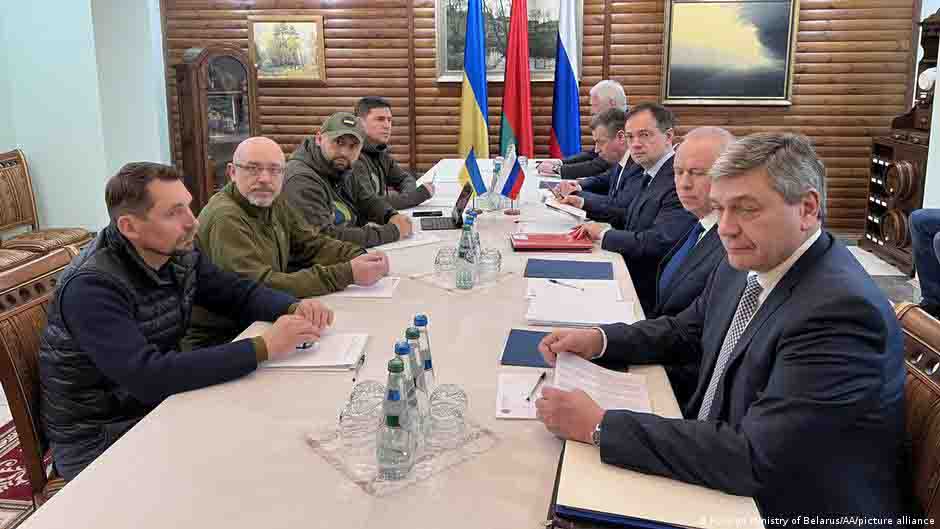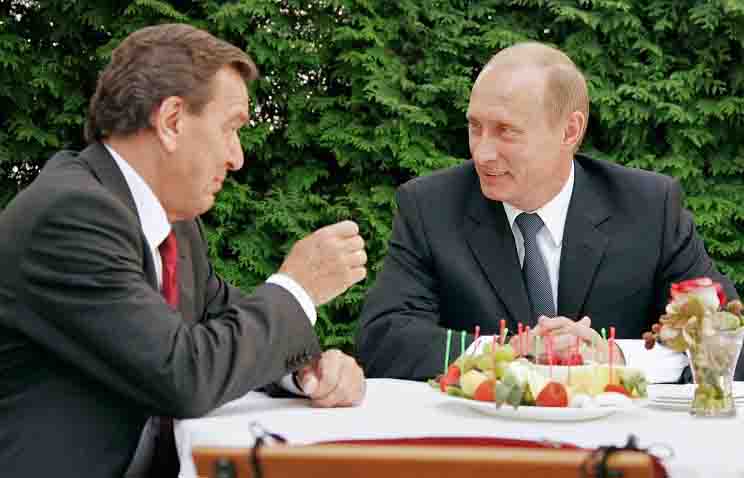There is no unanimity in Berlin in the matter of helping the fighting Ukraine, especially when it comes to providing the so-called "heavy weapons". Let us recall that the most important figure in German politics, i.e. Chancellor Olaf Scholz, said two days after Russia's attack on Ukraine: "February 24, 2022 is a turning point in the history of our continent."
After Scholz's statement, the surprise of the Western European elite was great, as was the joy on an international scale, especially among European allies. Arms deliveries for the ongoing war and mass rearming of the Bundeswehr with assets worth EUR 100 billion have been announced...
Words, words, words
The liberal Czech newspaper "Hospodarske noviny" summed it up as follows: "The time when Chancellor Olaf Scholz could become the true leader of Europe is long gone." It was supposed to be a lot, done quickly, without postponing... Everyone can see how it ended up!
From day to day, from week to week, the hall of shame of the German government is growing. Hans Heckel, in the Preussische Allgemeine Zeitung, gives a bitter and true testimony about the German government under the aegis of Scholz: "The rulers do not have sufficient intellectual standing or political orientation to meet this real historical challenge."
Among the ruling coalition, referred to in Germany as "traffic lights" (due to three colors: yellow - Free Democrats (FDP), red - Socialist Party of Germany, SPD, and green - the Greens), there is a dispute over the supply of weapons to Ukraine. Chancellor Olaf Scholz is criticized by some members of the Greens, but also by the FDP, for his indecisive behavior. Also to the party to which Scholz has been a member since 1975, his position on this issue is unclear.
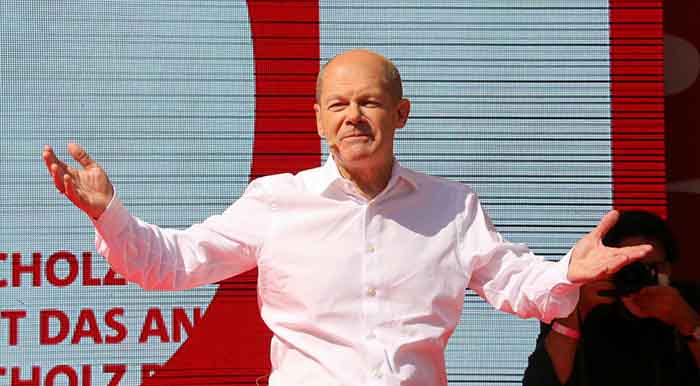
Chancellor Olaf Scholz (Source: Wikipedia)
Michael Roth (SPD), chairman of the European Affairs Committee, who spoke in favor of supplying weapons to Ukraine, sharply criticized the German Chancellor.
The DPA news agency said that the Greens and the FDP are definitely talking about the need for further aid to Kiev, also in the form of heavy weapons. Anton Hofreiter, a politician from the Green Party, demanded from Chancellor Scholz: "No more stagnation!!! The problem is with the chancellor's office," he said on RTL. "We must now finally start supplying Ukraine with what it needs, and this includes heavy weapons. Germany must stop blocking the oil and coal embargo," he added. Foreign Minister Annalena Baerbock and Green Party leader Omid Nouripour are also in favor. Scholz's party colleague, former Green leader and European politician Reinhard Bütikofer, announced that the Greens will "continue to put pressure" on arms deliveries to Ukraine.
Marie-Agnes Strack-Zimmermann, chairman of the Defense Committee, also supported this form of assistance. She sharply criticized the leader of the SPD faction, Rolf Mützenich, who said about the supplies of heavy weapons to Ukraine: "they may have far-reaching consequences for the security of our country and NATO." An FDP member believes: "Rolf Mützenich is unfortunately one of those who neither understood nor wanted to understand the need to change times."
Polls show that most ordinary Germans also support the supply of heavy weapons. According to a representative poll by the Civey public opinion research institute, more than half of the population supports the supply of heavy weapons such as tanks, warplanes and warships. 53% of the respondents answered this question in the affirmative, and 13% – "perhaps yes", and only 34% were against.
What is Olaf Scholz Waiting For?
It must be mentioned that, before the war, he was also against the supply of weapons to Ukraine. He believed that if German weapons could be used to shoot Russians, the mere thought of it seemed "unbearable" to him. And although many Social Democrats come from the "peace movement" and consider the rearmament of Ukraine to be completely wrong, consternation reigns elsewhere in the SPD. Several MPs from his party told t-online that they were wondering what was going on in the chancellor's mind. Does Scholz hesitate to deliver the heavy weapon because, in his opinion, the decision has yet to crystallize?
Scholz's policy also largely resembles the leadership style of his predecessor, Angela Merkel. He likes to wait and watch developments and how moods swing before making final commitments. However, the situation is becoming more and more brutal.
How long will young mothers be raped in front of their children in Ukraine, the hands of old people be cut off before their being shot, and Ukrainian soldiers will be forced to kneel in front of a Russian soldier?
In order to really understand where this uncertainty, waiting, hesitancy, and postponement of decisions come from within the German chancellor, it is worth going back a few dozen years and analyzing his biography.
Stasi documents
Newly discovered documents from the Stasi (GDR Security Office) prove that "Juso" Olaf Scholz was a welcome guest in the GDR in the 1980s.
In the 1980s, the German Democratic Republic was — successfully — building communism. In West Germany, ruled by the SPD and FDP parties (Chancellor Helmut Schmidt), the formula of Willy Brandt and Egon Bahr appears: "change through rapprochement". Olaf Scholz was then a 30-year-old activist of "young socialists" (Juso - read: "yuzo" - is a youth organization of young socialists, Junge Sozialisten, an "extension" of the SPD).
Young Olaf not only stood out as a staunch critic of NATO, but also belonged to the Marxist wing of Stamokap in the Juso organization. During this period, and more precisely, on May 23, 1980, the then chairman Juso Gerhard Schröder received Egon Krenz, the head of the communist youth federation in the GDR for the first time on a visit to the Federal Republic. It was then agreed that FDJ and Juso would enter into official relations.
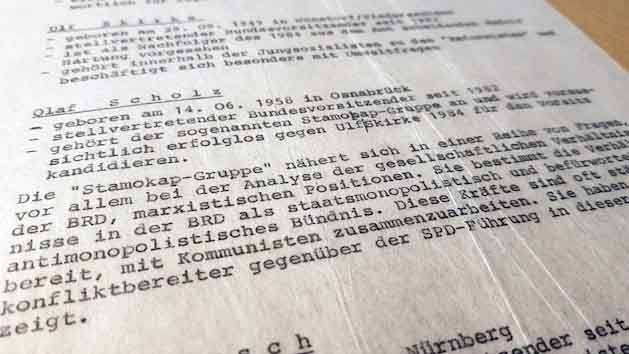
A document of Scholz's cooperation with the services of the GDR. In the documents of the Stasi Scholz it takes up a lot of space but, as is the case of other important German politicians, the most important ones are missing — they are in Moscow. (Source: Wikipedia.de)
Later, many meetings took place between Juso and the FDJ (GDR Komsomoltsy). In 1984 alone, six delegations crossed the internal Germany border. This culminated in Aurich's "revisit" to Bonn on December 17, 1984, during which Juso and the FDJ issued a joint communiqué in which they "strongly urged the immediate cessation of missile deployments" and demanded the dismantling of existing systems.
At that time, Juso — Young Socialists from the German Federal Republic — took part in the International Youth Camp for the first time, which the FDJ organized every year for left-wing youth activists from the Federal Republic and Austria. The six-day event at Werder near Potsdam consisted of lectures by experienced SED agitators, evening music performances, film screenings, and excursions. There are many revealing documents about Olaf Scholz found in the legacy after the GDR. They carefully noted that the SPD youth party (Juso) had moved to the left after Olaf Scholz was elected to the federal government.
Last year, FOCUS-Online announced new, previously unknown documents that shed light on Scholz's contacts with the GDR that come from the legacy of the FDJ, i.e. the youth SED. The historian Hubertus Knabe, in the article entitled "This is how close to power in the GDR the young socialist Olaf Scholz was" (Focus On-line, 09/24/21), reveals groundbreaking documents from the resources of the State Security Service of the GDR (Stasi). The historian writes: "Olaf Scholz was a welcome guest in the GDR" and "Juso were considered by the superiors of the SED as reliable partners in the fight for peace."
A year before the fall of the Berlin Wall, the Juso delegation led by Scholz assured its partners from the GDR youth organization FDJ that "the true enemies of peace (...) should be sought in the US military-industrial complex" and in the "steel helmet factions" of EU parties.
The chairman of the umbrella organization of East Germany victims, Dieter Dombrowski, in the article "Olaf Scholz's contacts with the GDR: the victims' association sees no reason to condemn Scholz" (Marcus Decker, RND, 1/31/22) said: "During the détente, Juso considered the GDR a model; it was then the standard. Olaf Scholz did what all Juso did. I don't think it was good. But it was like that." Most of Jusos were "not only blue-eyed" but also "GDR lovers".
It can therefore be assumed that the East German, and therefore Moscow's, indoctrination did not pass without a trace in the mind and beliefs of the Chancellor of the Federal Republic of Germany. This may explain the current behavior of his government, about which not only Prime Minister Morawiecki said, that Germany is "the biggest brake" when it comes to tougher sanctions against Moscow. " The phrase: "to brake" – "Bremse" – also appears very often in the German media next to the name of the German chancellor.



